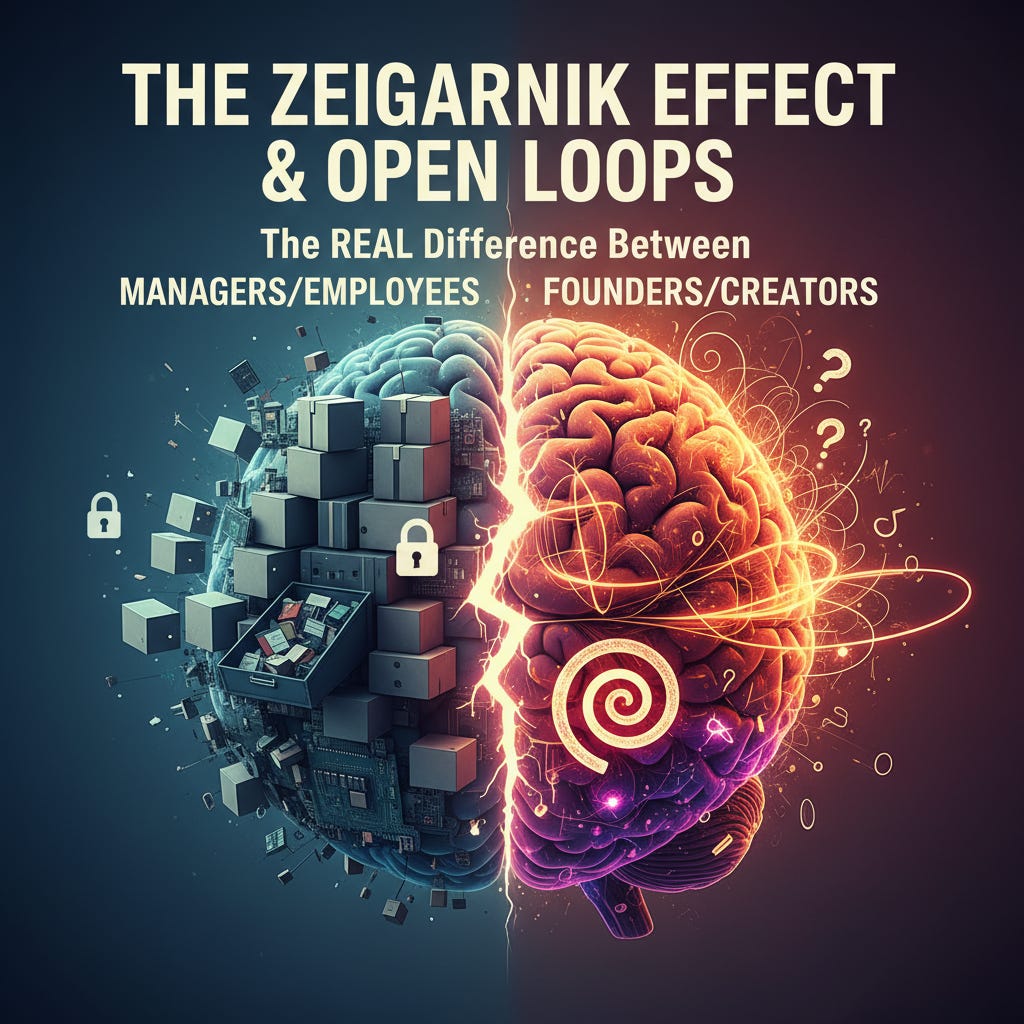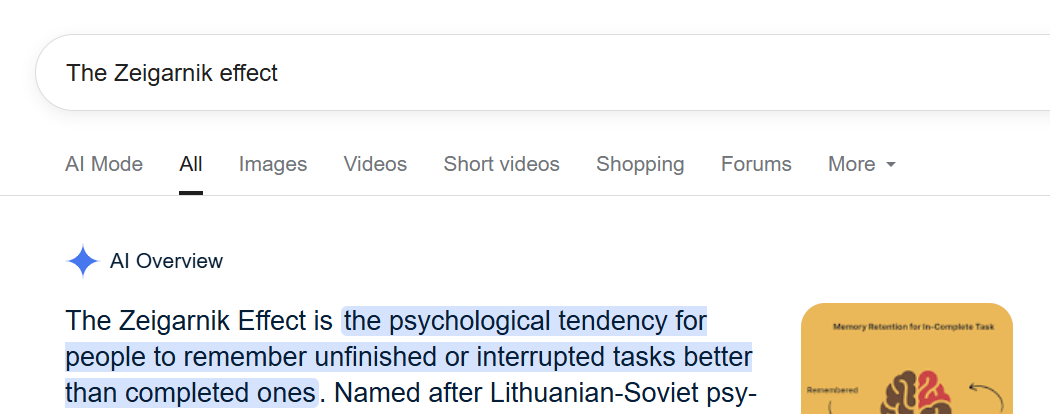The Zeigarnik effect & Open Loops
The real difference between founders/creators & managers/employees
Thought I’d write about a very interesting concept that came up again today, after I finally learned the official name for this effect and why open-loops are so frustrating.
The name of this effect (that has been bugging me for about a decade and a half) is apparently called the Zeigarnik effect.
Here’s the definition.
Or; “Open loops stay in our minds” “unfinished business” etc.
This effect is something I only found the name for 3 hours ago (Reading $100M money model’s lost chapters PDF), so I thought I’d write about it due to the fact it’s something that’s been bugging me for the past decade, albeit having partially solved the issue without defining it….
The effect is very well explained in business with the maker vs manager concept, originally written about by Paul Graham in his June 2009 post on Maker vs Manager which is well worth a read.
This psychological phenomenon directly explains why the maker/manager schedule conflict is so disruptive.
Maker vs Manager
The core idea is there’s two types of schedules -- which he refers to as manager schedules and maker schedules. There's nothing inherently wrong with either, but they don't mix well together.
The manager schedule is the time-blocked calendar type schedule where you input meetings, tasks, calls etc into said blocks, and the practical approach is to meet with someone when you are both "free" aka an empty slot.
But the "maker" schedule, examples of which include but are not limited to; programmers, writers, artists, woodworkers, most founders, doesn't work like that.
A maker schedule is chunky, usually in half day chunks or “all day” until it’s done in some cases.
Which might literally be entire days or weeks in a row.
The issue is when these 2 schedules try to mix, it ruins the latter.
This is so much of a problem (that I’ve experienced firsthand as well) that this is how Alex Hormozi (business guy) refers to it;
But for a maker, it’s a mind-parasite. For them, the open loops and pending tasks eat up attention, disrupt immersion, and destroy a maker’s productivity. Even if you know something happens in the afternoon, you know you must limit your morning work. You have to pay attention to make sure you end on time. Never mind the intrusive thoughts interrupting your day...now you must also watch the clock at a regular interval which interrupts the work you do leading up to the meeting. And at some point, you begin to think about what needs to be covered in the meeting, wholly removing the maker from their project at hand.
This is also why so few people whether by internal or external design get into real flow state work when they are on the “manager schedule”.
Which is a real issue, as this flow-state-work, which is such an enjoyable experience that it should be the goal-itself according to Mihaly Csikszentmihalyi (original dude who came up with the flow state research), is hyper-productive as well.
Whether you have a job where individuals are more interested in being seen as working, rather than actually building something of value, or if it’s as simple as “keeping teams green” which is apparently a thing….
This all boils down to real issues with misalignment and lack of productivity or just straight up getting problems fixed.
Which misses the entire overall goal of productive output for any maker/builder/founder or business itself.
Even just an employee trying to build something real or of real value within a company, it becomes impossible to do in the 9-5 and most employees are disincentivized to do work outside of this anyway.
Many people I've spoken to in large corporations know the issues but think the incentive to fix the issues doesn’t align properly.
Both in the “it won’t get fixed anyway” part, as well as the actual financial incentive to fix a major corporate problem that could be worth millions or even tens of millions in saved costs or increased earnings.
Personal Examples & How to combat this
Currently I’m building some real-brand-shit which isn’t fully public yet.
This is an incredible amount of time in the maker schedule, it’s impossible to know how long each individual step will take and a (seemingly) infinite number of steps to get this thing off the ground.
But there’s obviously other business processes and projects that fall more into the manager phase, hence this maker/manager schedule is something I still have, albeit with the reduction of businesses and projects its getting a lot better.
There are still small amounts of time dealing with clients, customers, team members in other businesses and all these things knock you out of flow state…. If only there were something to help with focus….
Anyway.
There are some strategies I’ve used fairly effectively for this that might be useful.
The one I used when first starting up back in Uni was quite drastic and simply involved working 8pm-1am after work for 6 months to get some progress.
I don’t think that’s necessary but if you value success over sleep then you will succeed.
On a less dramatic note, here’s some strategies I use currently that are working increasingly well:
1.) Do not disturb mode - obvious one but under-utilised still.
2.) Brain FM on phone - Brain.FM uses “brain music” which is pretty similar to the idea of binaural beats which has been proven to improve focus and get you into flow state more effectively, scientifically proven in all studies on binaural beats, if you don’t want the app then just search binaural beats or similar ideas on YouTube but ensure you won’t get interrupted by ads or YouTube itself….
3.) Block or batch one entire day/period for “manager” tasks - if you run your own business or craft, block an entire day or a few mornings if one full day is not possible to complete these tasks. This is also beneficial to do with “life admin” tasks. Save yourself hours by batching everything at once.
4.) Stack small “manager tasks” into your schedule - I like to exercise in the morning a few hours after getting up, so I’m not going to be getting in flow state between 8-9.30am, so this is where I’ll stack a lot of mini manager tasks; emails, 5-10 minute daily tasks, alarm prep (below), betting model updates from the prior day etc, meaning after midday my calendar is completely clear so my one “task” is always just 12+ - Build SH.
5.) Add phone alarms - This is essential so you can “close the internal loop” - By writing exactly what that alarm is for will help you get out and back into flow state very quickly. E.G. A team-lineup for a bet I need to run the model for, I can set this alarm after teams will be released but before the match itself begins, so I don’t need to think about “timing” the model, I just do this for 2 minutes once the alarm goes off, run the numbers, make a bet if applicable and dive back into flow state work, knowing that if there’s any more games another alarm will go off later. Other things might be as simple as setting alarms for when you need to leave for an event.
Freeing up the mental capacity to work on the flow-state or heavy focus related things.



